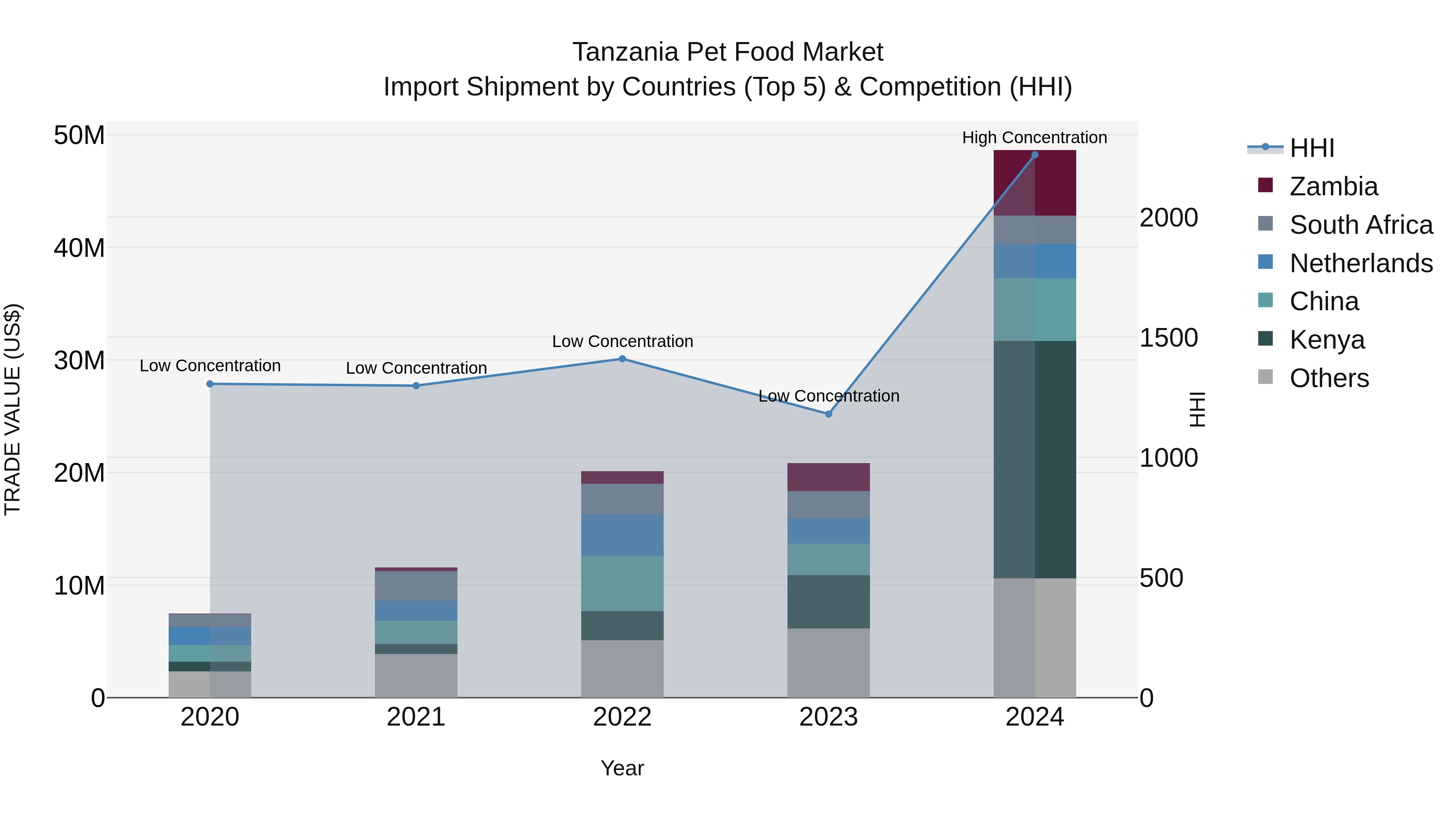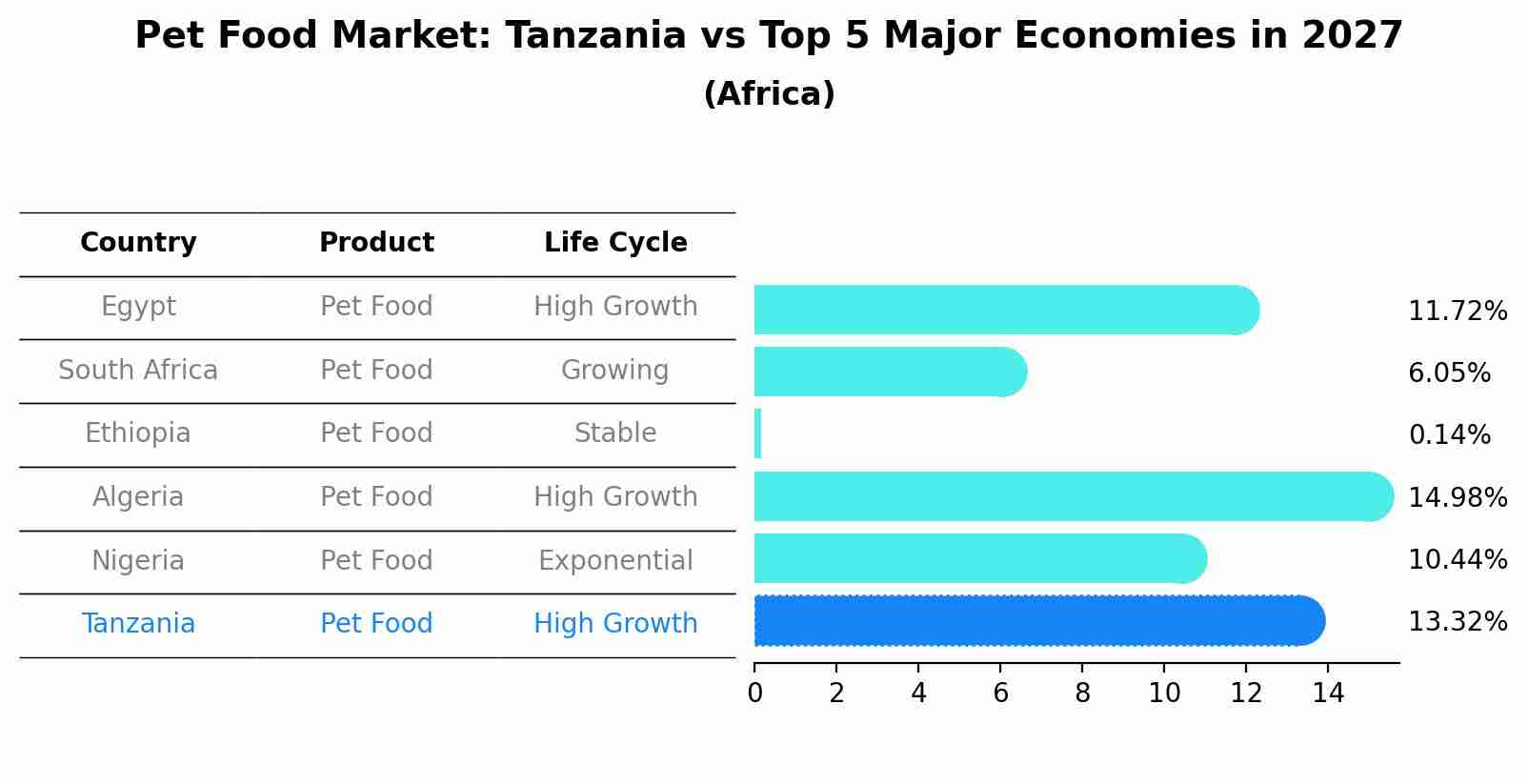Tanzania Pet Food Market Outlook | Size, Growth, Forecast, Value, Analysis, Companies, Industry, Revenue, Trends, COVID-19 IMPACT & Share
| Product Code: ETC383935 | Publication Date: Aug 2022 | Updated Date: Nov 2025 | Product Type: Market Research Report | |
| Publisher: 6Wresearch | Author: Bhawna Singh | No. of Pages: 75 | No. of Figures: 35 | No. of Tables: 20 |
Tanzania Pet Food Market: Top 5 Importing Countries and Market Competition (HHI) Analysis
In 2024, Tanzania`s pet food import market saw a significant increase in concentration, with the top exporting countries being Kenya, Zambia, China, Netherlands, and South Africa. The high Herfindahl-Hirschman Index (HHI) suggests a more consolidated market landscape. The impressive compound annual growth rate (CAGR) of 59.73% from 2020 to 2024 highlights the booming demand for pet food in Tanzania. Moreover, the remarkable growth rate of 133.58% from 2023 to 2024 indicates a rapid acceleration in import shipments, showcasing a lucrative opportunity for pet food suppliers in the region.

Pet Food Market: Tanzania vs Top 5 Major Economies in 2027 (Africa)
By 2027, Tanzania's Pet Food market is forecasted to achieve a high growth rate of 13.32%, with Egypt leading the Africa region, followed by South Africa, Ethiopia, Algeria and Nigeria.

Tanzania Pet Food Market Synopsis
The pet food market in Tanzania is experiencing steady growth, driven by increasing pet ownership and a growing awareness of pet health and nutrition among consumers. The market is primarily dominated by dry pet food products, followed by wet and treats/snacks segments. Major players in the market include international brands as well as local manufacturers offering a wide range of products to cater to different pet preferences and dietary needs. With a rising middle-class population and changing lifestyles leading to higher disposable incomes, the demand for premium and specialized pet food products is also on the rise. However, challenges such as price sensitivity, distribution issues, and limited availability of specialized products in rural areas present obstacles to market growth. Overall, the Tanzania pet food market presents opportunities for both local and international companies to expand their presence and offerings in the country.
Tanzania Pet Food Market Trends
The Tanzania Pet Food Market is experiencing a shift towards premium and specialized products as pet owners become more conscious of their pets` health and well-being. There is a growing demand for natural, organic, and grain-free pet food options, driven by the increasing awareness of nutrition and dietary requirements for pets. The market is also witnessing a rise in convenient and on-the-go pet food products, such as single-serve pouches and ready-to-eat meals. E-commerce and online platforms are playing a significant role in the distribution of pet food products, providing consumers with a wider range of choices and convenient shopping options. Overall, the Tanzania Pet Food Market is moving towards offering more diverse and high-quality products to cater to the evolving needs and preferences of pet owners.
Tanzania Pet Food Market Challenges
In the Tanzania Pet Food Market, challenges include limited consumer awareness and education about the benefits of commercial pet food, leading to a preference for traditional homemade diets. Distribution and logistics present hurdles due to the vast geographical landscape and underdeveloped infrastructure in certain regions, impacting the timely availability of pet food products. Affordability is a significant concern for many Tanzanian pet owners, as the higher cost of quality commercial pet food compared to homemade options can be prohibitive. Furthermore, regulatory issues and quality control standards may vary, affecting consumer trust in the market. Overall, addressing these challenges will require targeted marketing strategies, improved distribution networks, and efforts to educate consumers on the nutritional value and benefits of commercial pet food options.
Tanzania Pet Food Market Investment Opportunities
The Tanzania Pet Food Market presents promising investment opportunities due to the country`s growing pet ownership rates and increasing disposable income levels. There is a rising demand for high-quality and specialized pet food products, driven by a shift towards premiumization and health-conscious choices among pet owners. Investors can explore opportunities in manufacturing and distributing premium pet food brands, introducing organic and natural pet food options, and expanding product lines to cater to specific dietary requirements such as grain-free or hypoallergenic formulas. Additionally, investing in online retail platforms for pet food delivery can capitalize on the convenience factor for pet owners. By tapping into this growing market trend and offering innovative and high-quality products, investors can establish a strong presence and drive growth in the Tanzania Pet Food Market.
Jordan Agar Market Government Policies
Government policies related to the Tanzania Pet Food Market primarily focus on ensuring product safety and quality standards. The Tanzania Food, Drugs, and Cosmetics Act regulate the manufacturing, importation, and sale of pet food products to guarantee they meet the necessary quality and safety requirements. Additionally, the Tanzania Bureau of Standards (TBS) sets standards for pet food ingredients and labeling to protect consumer interests and ensure transparency in the market. Import regulations may also apply to pet food products to control the quality of imported goods and protect local industries. Overall, these policies aim to safeguard the health and well-being of pets while promoting fair competition and consumer confidence in the Tanzania Pet Food Market.
Tanzania Pet Food Market Future Outlook
The Tanzania Pet Food Market is expected to experience steady growth in the coming years due to increasing pet ownership rates and rising disposable incomes. The trend towards humanization of pets, where owners treat their pets as family members, is driving demand for higher quality and specialized pet food products. Additionally, the expanding urban population and changing lifestyles are likely to further boost the market as more people in urban areas opt for pets as companions. As awareness about pet health and nutrition continues to grow, there is a shift towards premium and organic pet food options. With the market becoming more competitive, there is also a rise in innovative product offerings and marketing strategies to cater to the diverse needs of pet owners in Tanzania.
Key Highlights of the Report:
- Tanzania Pet Food Market Outlook
- Market Size of Tanzania Pet Food Market, 2021
- Forecast of Tanzania Pet Food Market, 2031
- Historical Data and Forecast of Tanzania Pet Food Revenues & Volume for the Period 2018 - 2031
- Tanzania Pet Food Market Trend Evolution
- Tanzania Pet Food Market Drivers and Challenges
- Tanzania Pet Food Price Trends
- Tanzania Pet Food Porter's Five Forces
- Tanzania Pet Food Industry Life Cycle
- Historical Data and Forecast of Tanzania Pet Food Market Revenues & Volume By Type for the Period 2018 - 2031
- Historical Data and Forecast of Tanzania Pet Food Market Revenues & Volume By Dry Food for the Period 2018 - 2031
- Historical Data and Forecast of Tanzania Pet Food Market Revenues & Volume By Wet Food for the Period 2018 - 2031
- Historical Data and Forecast of Tanzania Pet Food Market Revenues & Volume By Snacks/Treats for the Period 2018 - 2031
- Historical Data and Forecast of Tanzania Pet Food Market Revenues & Volume By Animal for the Period 2018 - 2031
- Historical Data and Forecast of Tanzania Pet Food Market Revenues & Volume By Dog for the Period 2018 - 2031
- Historical Data and Forecast of Tanzania Pet Food Market Revenues & Volume By Cat for the Period 2018 - 2031
- Historical Data and Forecast of Tanzania Pet Food Market Revenues & Volume By Others for the Period 2018 - 2031
- Tanzania Pet Food Import Export Trade Statistics
- Market Opportunity Assessment By Type
- Market Opportunity Assessment By Animal
- Tanzania Pet Food Top Companies Market Share
- Tanzania Pet Food Competitive Benchmarking By Technical and Operational Parameters
- Tanzania Pet Food Company Profiles
- Tanzania Pet Food Key Strategic Recommendations
Frequently Asked Questions About the Market Study (FAQs):
- Single User License$ 1,995
- Department License$ 2,400
- Site License$ 3,120
- Global License$ 3,795
Search
Thought Leadership and Analyst Meet
Our Clients
Related Reports
- South Africa Stationery Market (2025-2031) | Share, Size, Industry, Value, Growth, Revenue, Analysis, Trends, Segmentation & Outlook
- Afghanistan Rocking Chairs And Adirondack Chairs Market (2026-2032) | Size & Revenue, Competitive Landscape, Share, Segmentation, Industry, Value, Outlook, Analysis, Trends, Growth, Forecast, Companies
- Afghanistan Apparel Market (2026-2032) | Growth, Outlook, Industry, Segmentation, Forecast, Size, Companies, Trends, Value, Share, Analysis & Revenue
- Canada Oil and Gas Market (2026-2032) | Share, Segmentation, Value, Industry, Trends, Forecast, Analysis, Size & Revenue, Growth, Competitive Landscape, Outlook, Companies
- Germany Breakfast Food Market (2026-2032) | Industry, Share, Growth, Size, Companies, Value, Analysis, Revenue, Trends, Forecast & Outlook
- Australia Briquette Market (2025-2031) | Growth, Size, Revenue, Forecast, Analysis, Trends, Value, Share, Industry & Companies
- Vietnam System Integrator Market (2025-2031) | Size, Companies, Analysis, Industry, Value, Forecast, Growth, Trends, Revenue & Share
- ASEAN and Thailand Brain Health Supplements Market (2025-2031) | Strategy, Consumer Insights, Analysis, Investment Trends, Opportunities, Growth, Size, Share, Industry, Revenue, Segments, Value, Segmentation, Supply, Forecast, Restraints, Outlook, Competition, Drivers, Trends, Demand, Pricing Analysis, Competitive, Strategic Insights, Companies, Challenges
- ASEAN Bearings Market (2025-2031) | Strategy, Consumer Insights, Analysis, Investment Trends, Opportunities, Growth, Size, Share, Industry, Revenue, Segments, Value, Segmentation, Supply, Forecast, Restraints, Outlook, Competition, Drivers, Trends, Demand, Pricing Analysis, Competitive, Strategic Insights, Companies, Challenges
- Europe Flooring Market (2025-2031) | Outlook, Share, Industry, Trends, Forecast, Companies, Revenue, Size, Analysis, Growth & Value
Industry Events and Analyst Meet
Whitepaper
- Middle East & Africa Commercial Security Market Click here to view more.
- Middle East & Africa Fire Safety Systems & Equipment Market Click here to view more.
- GCC Drone Market Click here to view more.
- Middle East Lighting Fixture Market Click here to view more.
- GCC Physical & Perimeter Security Market Click here to view more.
6WResearch In News
- Doha a strategic location for EV manufacturing hub: IPA Qatar
- Demand for luxury TVs surging in the GCC, says Samsung
- Empowering Growth: The Thriving Journey of Bangladesh’s Cable Industry
- Demand for luxury TVs surging in the GCC, says Samsung
- Video call with a traditional healer? Once unthinkable, it’s now common in South Africa
- Intelligent Buildings To Smooth GCC’s Path To Net Zero


















